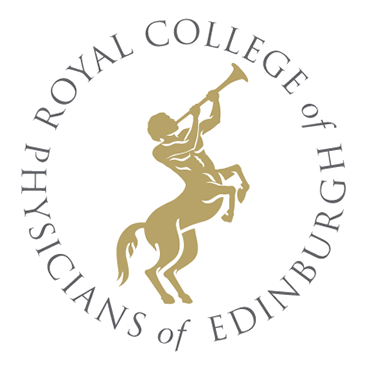
The Consultation Letters of Dr William Cullen (1710-1790) at the Royal College of Physicians of Edinburgh
[ID:2342] From: Dr James Currie / To: Dr William Cullen (Professor Cullen) / Regarding: Mr Yates (Patient) / 17 October 1783 / (Incoming)
Letter from Dr James Currie, describing the case of Mr Howard and reporting on the progress of Mr Yates. He also comments on experiments on diabetes carried out by Cullen's early pupil Dr Matthew Dobson in Bath, and he mentions the College of Manchester, which he considers a 'paultry business'. Hand-delivered by Mr Howard, an Edinburgh medical student.
- Facsimile
- Normalized Text
- Diplomatic Text
- Metadata
- Case
- People
- Places
Facsimile
There are 4 images for this document.
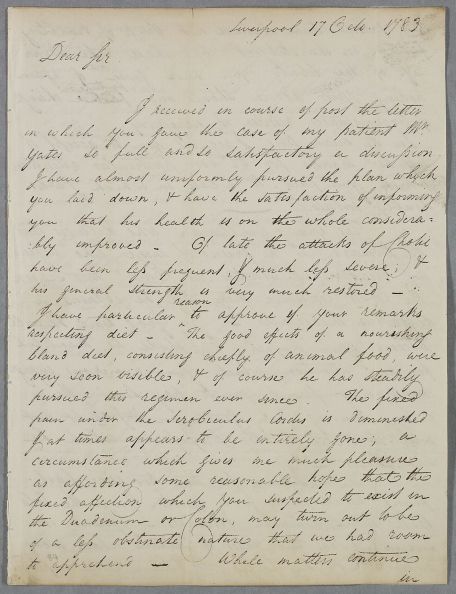
[Page 1]
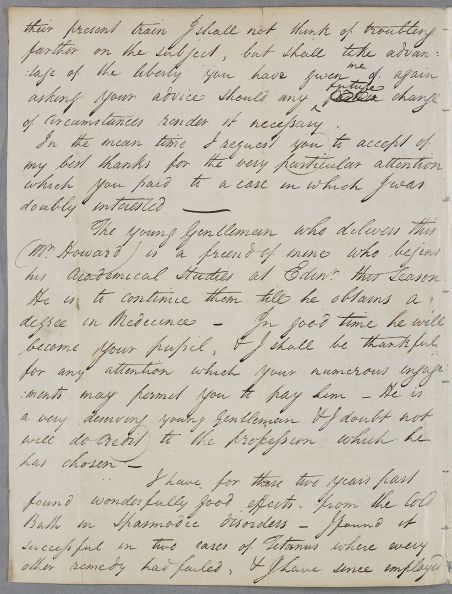
[Page 2]
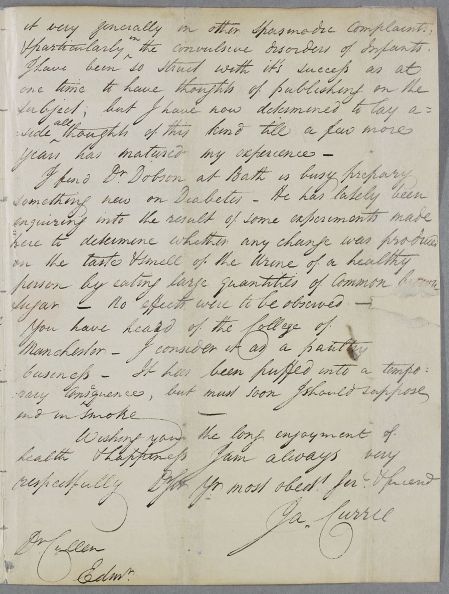
[Page 3]
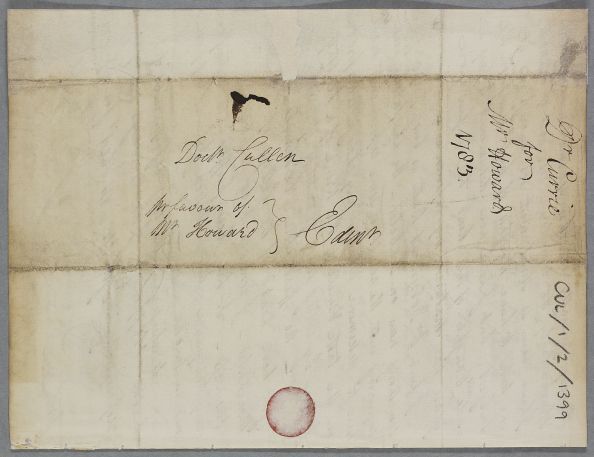
[Page 4]
Metadata
| Field | Data |
|---|---|
| DOC ID | 2342 |
| RCPE Catalogue Number | CUL/1/2/1399 |
| Main Language | English |
| Document Direction | Incoming |
| Date | 17 October 1783 |
| Annotation | None |
| Type | Authorial original |
| Enclosure(s) | No enclosure(s) |
| Autopsy | No |
| Recipe | No |
| Regimen | No |
| Letter of Introduction | Yes |
| Case Note | Yes |
| Summary | Letter from Dr James Currie, describing the case of Mr Howard and reporting on the progress of Mr Yates. He also comments on experiments on diabetes carried out by Cullen's early pupil Dr Matthew Dobson in Bath, and he mentions the College of Manchester, which he considers a 'paultry business'. Hand-delivered by Mr Howard, an Edinburgh medical student. |
| Manuscript Incomplete? | No |
| Evidence of Commercial Posting | No |
Case
Cases that this document belongs to:
| Case ID | Description | Num Docs |
|---|---|---|
| [Case ID:1676] |
Case of Mr Yates whose colic improves after following Cullen's advice. |
2 |
People linked to this document
| Person ID | Role in document | Person |
|---|---|---|
| [PERS ID:468] | Author | Dr James Currie |
| [PERS ID:1] | Addressee | Dr William Cullen (Professor Cullen) |
| [PERS ID:1118] | Patient | Mr Yates |
| [PERS ID:1] | Patient's Physician / Surgeon / Apothecary | Dr William Cullen (Professor Cullen) |
| [PERS ID:469] | Other Physician / Surgeon | Dr Matthew Dobson |
| [PERS ID:1117] | Other | Mr Howard |
Places linked to this document
| Role in document | Specific Place | Settlements / Areas | Region | Country | Global Region | Confidence |
|---|---|---|---|---|---|---|
| Place of Writing | Liverpool | North-West | England | Europe | certain | |
| Destination of Letter | Edinburgh | Edinburgh and East | Scotland | Europe | certain | |
| Mentioned / Other | Bath | South-West | England | Europe | certain |
Normalized Text
I received in course of post the letter
in which you gave the case of my patient Mr.
Yates so full and so satisfactory a discussion.
I have almost uniformly pursued the plan which
you laid down, & have the satisfaction of informing
you that his health is on the whole consider–
ably improved. Of late the attacks of Cholic
have been less frequent, & much less severe; &
his general strength is very much restored –
I have particular ↑reason↑ to approve of your remarks
respecting diet - The good effects of a nourishing
bland diet, consisting chiefly of animal food, were
very soon visible, & of course he has steadily
pursued the regimen ever since. The fixed
pain under the Scrobiculus Cordis is diminished
& at times appears to be entirely gone; a
circumstance which gives me much pleasure
as affording some reasonable hope that the
fixed affection which you suspected to exist in
the Duodenum or Colon,
may turn out to be
of a less obstinate nature that we had room
to apprehend - While matters continue in
[Page 2]
their present train I shall not think of troubling
further on the subject, but shall take advan¬
tage of the liberty you have given ↑me↑ of again
asking your advice should any [further?] ↑future↑ change
of circumstances render it necessary.
In the meantime I request you to accept of
my best thanks for the very particular attention
which you paid to a case in which I was
doubly interested –––
The young Gentleman who delivers this
(Mr. Howard) is a friend of mine who begins
his Academical Studies at Edinburgh
this Season.
He is to continue them till be obtains a
degree in Medicine – In good time he will
become your pupil, & I shall be thankful
for any attention which your numerous engage¬
ments may permit you to pay him – He is
a very deserving young Gentleman & I doubt not
will do credit to the profession which he
has chosen –
I have for these two years past
found wonderfully good effects from the Cold
Bath in Spasmodic disorders – I found it
sucessful in two cases of Tetanus where every
other remedy had failed, & I have since employed
[Page 3]
it very generally in other Spasmodic complaints
& particulary ↑in↑ the convulsive disorders of Infants.
I have been so struck with its success as at
one time to have thoughts of publishing on the
subject, but I have now determined to lay a¬
side ↑all↑ thoughts of this kind till a few more
years have matured my experience –
I find Dr Dobson at Bath is busy preparing
something new on Diabetes 1 – He has lately been
enquiring into the result of some experiments made
here to determine whether any change was produced
on the taste & smell of the Urine of a healthy
person by eating large quantities of common brown
sugar – No effects were to be observed –
You have heard of the College of
Manchester 2 – I consider it as a paultry
business – It has been much puffed into a tempo¬
rary cons↑e↑quence, but must soon I should suppose
end in smoke –
Wishing you the long enjoyment of
health & happiness I am always very
respectfully
[Page 4]
Doctr Cullen
[for?] favour of
Mr. Howard Edinburgh
Dr Currie
for
Mr Howard
1783.
Notes:
1: The physician and natural philosopher Matthew Dobson (1732-1784), had matriculated at Glasgow University in 1750 where he reputedly assisted Cullen with his experiments with chemical freezing. By this date Dobson, who practiced at Liverpool where he was a leading member of a community of scientifically inclined dissenters, had retired to Bath. Dobson was the first to establish that the urine of diabetic patients contained sugar, as reported in an article, ‘Experiments and observations on the urine in diabetes’, in Medical Observations and Inquiries (Vol. 5, 1774). For further details and sources see Margaret DeLacy, 'Matthew Dobson' in ODNB
2: Probably the dissenting college (or academy), begun at Warrington in 1752, before actually moving to Manchester in 1786. Matthew Dobson played a role in promoting the dissenting academies of North-West England.
Diplomatic Text
I received in course of post the letter
in which you gave the case of my patient Mr.
Yates so full and so satisfactory a discussion.
I have almost uniformly pursued the plan which
you laid down, & have the satisfaction of informing
you that his health is on the whole consider–
ably improved. Of late the attacks of Cholic
have been less frequent, & much less severe; &
his general strength is very much restored –
I have particular ↑reason↑ to approve of your remarks
respecting diet - The good effects of a nourishing
bland diet, consisting chiefly of animal food, were
very soon visible, & of course he has steadily
pursued the regimen ever since. The fixed
pain under the Scrobiculus Cordis is diminished
& at times appears to be entirely gone; a
circumstance which gives me much pleasure
as affording some reasonable hope that the
fixed affection which you suspected to exist in
the Duodenum or Colon,
may turn out to be
of a less obstinate nature that we had room
to apprehend - While matters continue in
[Page 2]
their present train I shall not think of troubling
further on the subject, but shall take advan¬
tage of the liberty you have given ↑me↑ of again
asking your advice should any [further?] ↑future↑ change
of circumstances render it necessary.
In the meantime I request you to accept of
my best thanks for the very particular attention
which you paid to a case in which I was
doubly interested –––
The young Gentleman who delivers this
(Mr. Howard) is a friend of mine who begins
his Academical Studies at Edinr
this Season.
He is to continue them till be obtains a
degree in Medicine – In good time he will
become your pupil, & I shall be thankful
for any attention which your numerous engage¬
ments may permit you to pay him – He is
a very deserving young Gentleman & I doubt not
will do credit to the profession which he
has chosen –
I have for these two years past
found wonderfully good effects from the Cold
Bath in Spasmodic disorders – I found it
sucessful in two cases of Tetanus where every
other remedy had failed, & I have since employed
[Page 3]
it very generally in other Spasmodic complaints
& particulary ↑in↑ the convulsive disorders of Infants.
I have been so struck with its success as at
one time to have thoughts of publishing on the
subject, but I have now determined to lay a¬
side ↑all↑ thoughts of this kind till a few more
years have matured my experience –
I find Dr Dobson at Bath is busy preparing
something new on Diabetes 1 – He has lately been
enquiring into the result of some experiments made
here to determine whether any change was produced
on the taste & smell of the Urine of a healthy
person by eating large quantities of common brown
sugar – No effects were to be observed –
You have heard of the College of
Manchester 2 – I consider it as a paultry
business – It has been much puffed into a tempo¬
rary cons↑e↑quence, but must soon I should suppose
end in smoke –
Wishing you the long enjoyment of
health & happiness I am always very
respectfully
[Page 4]
Doctr Cullen
[for?] favour of
Mr. Howard Edinr
Dr Currie
for
Mr Howard
1783.
Notes:
1: The physician and natural philosopher Matthew Dobson (1732-1784), had matriculated at Glasgow University in 1750 where he reputedly assisted Cullen with his experiments with chemical freezing. By this date Dobson, who practiced at Liverpool where he was a leading member of a community of scientifically inclined dissenters, had retired to Bath. Dobson was the first to establish that the urine of diabetic patients contained sugar, as reported in an article, ‘Experiments and observations on the urine in diabetes’, in Medical Observations and Inquiries (Vol. 5, 1774). For further details and sources see Margaret DeLacy, 'Matthew Dobson' in ODNB
2: Probably the dissenting college (or academy), begun at Warrington in 1752, before actually moving to Manchester in 1786. Matthew Dobson played a role in promoting the dissenting academies of North-West England.
XML
XML file not yet available.
Feedback
Send us specfic feeback about this document [DOC ID:2342]
Please note that the Cullen Project team have now disbanded but your comments will be logged in our system and we will look at them one day...

